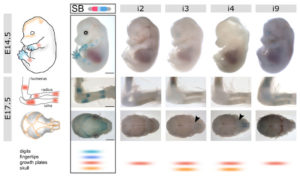
Biosciences researchers Axel Visel (JGI/EGSB) and Marco Osterwalder (EGSB) contributed to a study, led by researchers at the Max Planck Institute for Molecular Genetics, in which targeted genome editing and a transgenic reporter assay were used to characterize elements regulating Ihh (encoding Indian hedgehog) in mice. Indian hedgehog is a mammalian signaling protein involved with the development and proliferation of cells in cartilage. In humans, copy number variants (CNVs) upstream of Ihh cause localized phenotypes including premature fusion of the sutures of the skull and malformation of the phalanges. The study, published in Nature Genetics, showed that in mice Ihh is regulated by modular ensembles of enhancers (with individual tissue specificities) that appear to act in an additive manner. Despite apparent redundancy and overlapping function of enhancers, these ensembles—in which the correct number of each enhancer is present—are necessary for precise spatiotemporal control of developmental gene expression.



